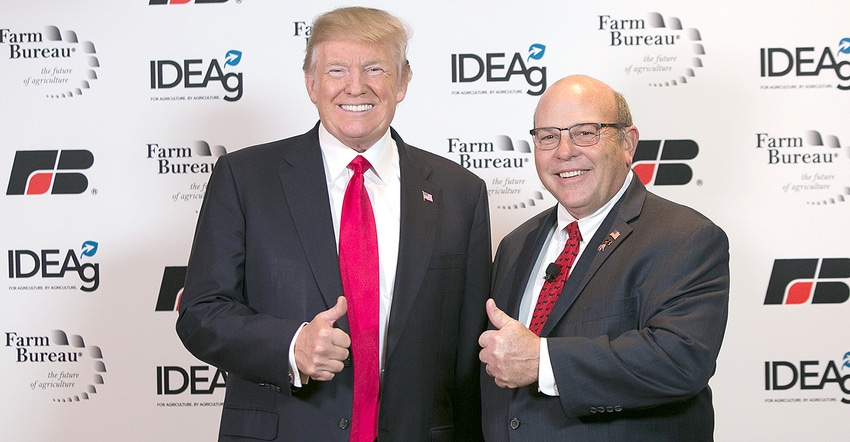
Every year the American Farm Bureau Federation sends a letter to the White House inviting the president to speak to Farm Bureau’s annual convention. Most of the time the president doesn’t come, but this year President Donald Trump did.
Trump was the first sitting president to speak to the AFBF convention since President George H.W. Bush addressed the nation’s largest farm group on Jan. 13, 1992 in Kansas City, Mo. President Ronald Reagan also spoke to the AFBF convention in Dallas on Jan. 11, 1983.
President Trump’s address to farmers and ranchers in Nashville on Jan. 8 clearly shows he supports and values agriculture. In fact, the president even promised to come back next year to Farm Bureau’s 100th annual meeting in New Orleans Jan. 11- 16.
“I’m so honored to be the first president to address the American Farm Bureau in more than 25 years. What happened? Where are they? What happened? What happened? Where are they?” Trump said to applause at the Farm Bureau convention.
“And you know this is your 99th year, so I was very disappointed to hear that. You understand. A hundred is so much cooler, I have to be honest. So I’ll be back, I think. Next year, I’ll come back. All right? We’ll come back,” the president promised.
In his AFBF address the president did touch on trade and the North American Free Trade Agreement which is vital to agriculture. There is concern that the president will blow up NAFTA because of his ongoing tough talk on trade.
NAFTA has clearly benefited American agriculture and farm leaders want to keep the trade pact with Mexico and Canada. The value of U.S. exports from NAFTA increased from $9 billion in 1993 to $39 billion and Canada and Mexico represent 30 percent of total U.S. exports. NAFTA was implemented in 1994.
AFBF policy states that any renegotiation of NAFTA must protect the gains achieved in agricultural trade and work to remove remaining barriers to trade with Canada and Mexico. AFBF President Zippy Duvall has said Farm Bureau’s priority throughout the renegotiation of NAFTA has been and remains to do no harm to agricultural trade between the NAFTA countries.
In his Farm Bureau speech, Trump said his trade goal is “level the playing field for our great American exporters — our farmers and ranchers, as well as our manufacturers — we are reviewing all of our trade agreements to make sure they are fair and reciprocal — reciprocal, so important.”
“On NAFTA, I am working very hard to get a better deal for our country and for our farmers and for our manufacturers. It’s under negotiation as we speak. But think of it: When Mexico is making all of that money, when Canada is making all of that money; it’s not the easiest negotiation. But we’re going to make it fair for you people again,” Trump said.
When it is all said and done, most expect the U.S. will remain in NAFTA. Speaking at the Ag Development Forum during the Southern Farm Show in Raleigh Feb. 1 Randy Russell with the Russell Group in Washington, D.C. noted that Trump’s tough talk on trade is really a negotiating tactic. He is confident the U.S. will stay in NAFTA, but it will be modernized.
Let’s hope he’s right. Trade is vital for agriculture and NAFTA has been very beneficial to America’s farmers and ranchers.
About the Author(s)
You May Also Like






